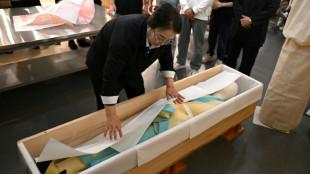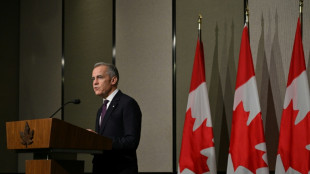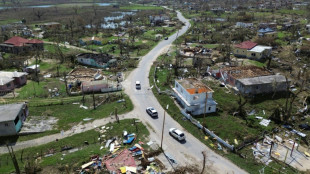
-
 US Navy veterans battle PTSD with psychedelics
US Navy veterans battle PTSD with psychedelics
-
'Unheard of': Dodgers in awe of iron man Yamamoto

-
 UK police probe mass train stabbing that wounded 10
UK police probe mass train stabbing that wounded 10
-
'It's hard' - Jays manager Schneider rues missed chances in World Series defeat

-
 Women's cricket set for new champion as India, South Africa clash
Women's cricket set for new champion as India, South Africa clash
-
Messi scores but Miami lose as Nashville level MLS Cup playoff series

-
 Dodgers clinch back-to-back World Series as Blue Jays downed in thriller
Dodgers clinch back-to-back World Series as Blue Jays downed in thriller
-
Vietnam flood death toll rises to 35: disaster agency

-
 History-making Japan golf twins push each other to greater heights
History-making Japan golf twins push each other to greater heights
-
Death becomes a growing business in ageing, lonely South Korea

-
 India's cloud seeding trials 'costly spectacle'
India's cloud seeding trials 'costly spectacle'
-
Chiba wins women's title, Malinin leads at Skate Canada

-
 Siakam sparks injury-hit Pacers to season's first NBA win
Siakam sparks injury-hit Pacers to season's first NBA win
-
Denmark's fabled restaurant noma sells products to amateur cooks

-
 UK train stabbing wounds 10, two suspects arrested
UK train stabbing wounds 10, two suspects arrested
-
Nashville top Messi's Miami 2-1 to level MLS Cup playoff series

-
 Fergie, her daughters and the corgis hit by Andrew crisis
Fergie, her daughters and the corgis hit by Andrew crisis
-
'I can't eat': Millions risk losing food aid during US shutdown

-
 High price of gold inspires new rush in California
High price of gold inspires new rush in California
-
'Swing for the fences': Carney promises bold budget as US threat grows

-
 UK police arrest two after 'multiple people' stabbed on train
UK police arrest two after 'multiple people' stabbed on train
-
NBA Hawks lose guard Young for four weeks with knee sprain

-
 50 dead as Caribbean digs out from Hurricane Melissa
50 dead as Caribbean digs out from Hurricane Melissa
-
Forever Young gives Japan first Breeders' Cup Classic triumph

-
 Mbappe's Real Madrid extend Liga lead, Villarreal move second
Mbappe's Real Madrid extend Liga lead, Villarreal move second
-
Salah savours 'great feeling' after 250th Liverpool goal

-
 Ethical Diamond surges to upset win in $5 million Breeders' Cup Turf
Ethical Diamond surges to upset win in $5 million Breeders' Cup Turf
-
Kinghorn kicks Toulouse to Top 14 summit

-
 Mbappe extends Real Madrid's Liga lead in Valencia rout
Mbappe extends Real Madrid's Liga lead in Valencia rout
-
All Blacks sink 14-man Ireland 26-13 in Chicago Test

-
 World champ Malinin takes lead at Skate Canada
World champ Malinin takes lead at Skate Canada
-
Liverpool snap losing streak as Salah hits 250 goals in Villa win

-
 Salah's 250th Liverpool goal sinks Villa as Arsenal cruise at Burnley
Salah's 250th Liverpool goal sinks Villa as Arsenal cruise at Burnley
-
Morant suspended by Grizzlies after rebuking coaching staff

-
 Spalletti begins Juve tenure with win at Cremonese but Napoli held
Spalletti begins Juve tenure with win at Cremonese but Napoli held
-
Frank refuses to condemn Van de Ven, Spence for snub in Spurs defeat

-
 France superstar Dupont extends Toulouse deal
France superstar Dupont extends Toulouse deal
-
Egypt officially opens grand museum near pyramids

-
 French fraud watchdog reports Shein for 'childlike' sex dolls
French fraud watchdog reports Shein for 'childlike' sex dolls
-
Scotland thrash USA before All Blacks' clash

-
 Five things to know about the Grand Egyptian Museum
Five things to know about the Grand Egyptian Museum
-
Bayern rest stars but ease past Leverkusen before PSG clash

-
 Dead quiet: Paris Catacombs close for renovations
Dead quiet: Paris Catacombs close for renovations
-
Families separated, children killed as survivors flee Sudan's 'apocalyptic' El-Fasher

-
 Napoli held by Como as Spalletti begins Juve adventure
Napoli held by Como as Spalletti begins Juve adventure
-
Southampton boss Still vows to fight on as pressure mounts

-
 Borthwick hails 'ball of energy' Pollock as England down Australia
Borthwick hails 'ball of energy' Pollock as England down Australia
-
Egypt opens grand museum in lavish, pharaonic ceremony

-
 Joao Pedro strikes at last as Chelsea edge past Spurs
Joao Pedro strikes at last as Chelsea edge past Spurs
-
Ohtani to open for Dodgers in World Series deciding game seven


From new treatments to AI: advances in the fight against cancer
From combining treatments in unprecedented ways to deploying artificial intelligence for personalised medicine, a raft of new advances in the fight against cancer have been presented at the European Society for Medical Oncology (ESMO), which ends on Tuesday.
Here are some of the big announcements made at the five-day conference held in the Spanish city of Barcelona, which brought together 30,000 specialist doctors and researchers from around the world.
- Breastfeeding after cancer -
Women who breastfeed after receiving treatment for breast cancer do not have a higher risk of their cancer returning or of getting new tumours, according to two international studies presented at the conference.
This was also true for women carrying a genetic mutation called BRCA, which significantly increases the chance of developing breast cancer, the research found.
There had previously been concerns about pregnancy and breastfeeding after women had been diagnosed with breast cancer, because both can affect hormone levels.
"These results are key for women who wish to become pregnant and breastfeed their baby after breast cancer," said Fedro Alessandro Peccatori, a researcher and doctor at the European Institute of Oncology in Milan.
- New combination for lung cancer -
Immunotherapy, which stimulates the body's immune system to fight tumours, has already been shown to be an effective weapon against lung cancer.
On Saturday, the results of a phase two trial revealed promising signs against metastatic non-small cell lung cancer, which is when the most common form of lung cancer spreads to other parts of the body.
The trial tested a new combination of two different immunotherapies along with chemotherapy.
"By aiming at a second target of the immune system and combining these treatments, it seems that we are improving response rates -- that is, the number of patients who have their tumours shrink," Nicolas Girard, an oncologist at France's Curie Institute, told AFP.
- Rare pregnancy-linked cancer -
Another combination of immunotherapy and chemotherapy produced excellent results against a very rare form of pregnancy-related cancer which develops in the placenta. The cancer only occurs in around one out of every 10,000 pregnancies.
The combination of treatments led to 96 percent of the cancer in patients being eradicated.
"This is an exceptional result," said Benoit You, a France-based oncologist who presented the research.
- AI for personalised medicine? -
A huge artificial intelligence (AI) algorithm trained on a database of more than a billion images of tumours from around 30,000 patients in the United States also showed promise for future cancer treatment, researchers said Monday.
The model is capable of "detecting a certain number of molecular anomalies and mutations that the human eye is not always able to see," Fabrice Andre, research head at France's Gustave Roussy cancer centre, told AFP.
In the long term, the doctors hope this kind of AI will be able to help them offer personalised treatments for each patient.
- Hope for saving affected organs -
One of the main messages to come out of the ESMO conference was that combining immunotherapy with radiation therapy before surgery improves the overall survival rates for a growing number of cancers, including for the breast, bladder and cervix.
But receiving these kinds of treatments ahead of surgery seems to also allow for the affected organs themselves to be saved, Andre said.
"Organ preservation is absolutely essential to have a quality of life that is as close as possible to normal," he said.
Research presented on Monday showed encouraging results for preserving rectums in patients with cancer affecting this important part of the digestive tract. This only occurs after the treatments have caused the tumour to completely vanish.
"Until now the standard was surgery, but it seems we are entering a new era where surgery could be avoided," said David Sebag- Montefiore, an oncologist and researcher at the UK's University of Leeds.
There are hopes that this treatment combination could also have the potential to work for other cancers, such as those of the ear, nose and throat -- or lungs.
I.Stoeckli--VB




